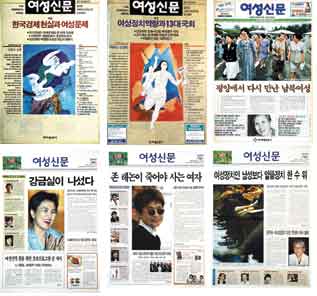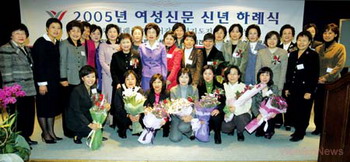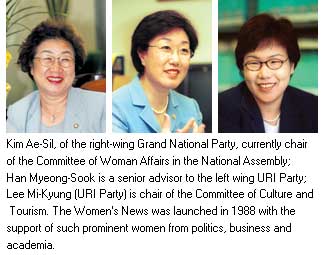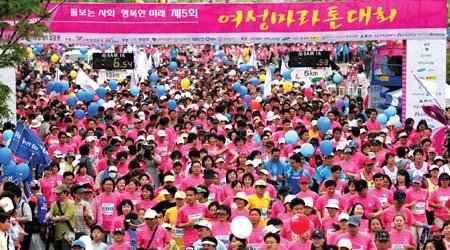Publicly listed in 1988, the Women's News was the first national weekly to represent a female point of view on various social matters. The Women's News has since become the most influential publication among Korean press on issues concerning gender and equality. We have 19 offices nationwide and a weekly circulation of 240,000.

The Women's News was founded by 1000 visionaries who pooled their resources to create a voice for gender equality. These promoters and shareholders came from diverse backgrounds, including university students, homemakers and community & business leaders.

The Women's News has campaigned unceasingly for the modification of unfair family law clauses, in particular for the abolishment of the Hoju system, whereby every family had a head and it was always the husband. The paper has highlighted the violation of human rights due to sexual violence and family violence. It has supported female senior citizens' in the case of a sunset divorce, when an elderly couple gets divorced. It has championed the childcare rights of unmarried mothers and it has fought for the human rights of disabled women who are victims of sexual violence.

In order to strengthen women's position in politics and public administration, the Women's News also encourages and sponsors female candidates for both provincial and national elections. In collaboration with other women's organizations, it launched a television debate between the 1997 presidential candidates to discuss policies for gender equality and women's rights. Such social issue debates have since become the norm for all presidential elections. The newspaper has also persistently investigated the policy stance of both national and provincial administrators, to shed light on any illegal or unequal law or policy.
On the occasion of the United Nations' International Year of the Family in 1994, the Women's News and the Korean government jointly launched the Equal Couple Prize. This yearly prize promotes the concept of equality between Korean marriage partners, for newlyweds and the elderly alike. In 1998, the “21st Century Women's Media Network” was launched. This association of mostly female journalists promotes a mass media culture based on gender equality. It awards prizes to journalists who contribute to the development of social and gender equality. To cultivate leaders for the future, the Women's New also selects its yearly “Future Female Leaders” candidates, based on recommendations from leading female politicians, professors, managers and other prominent women in society.
The Women's News organizes many other events to promote gender and social equality in mass culture. The “Female Marathon Game” has become the biggest women/family event in Korea, with over 10,000 participants every year. Also, the highly successful “10,000 Female Leaders' Concert” was organized for the first time in November 2004.

As we move forward into the 21st century, the Women's News will continue in its efforts to promote gender equality across all facts of Korean politics and society. It will offer counterproposals and solutions to our low birth rate and our ageing society. It will work for a more caring attitude toward the labor force. It will strive toward improving women's economic position. It will promote female leadership and a win-win male/female partnership. It will push for international female solidarity and it will draw attention to the ever-diversifying differences between the top and bottom ranges of society.
To mark its 15th anniversary in 2003, the Women's News changed from its previous tabloid format to a broadsheet format. Containing more than 23 pages weekly, it is published in modern Korean and is available every morning at newsstands across Seoul. As mentioned above, the Women's News has a weekly circulation of over 240,000 and we have 19 branch offices across the country.
For more information, please visit our website at www.womennews.co.kr.


